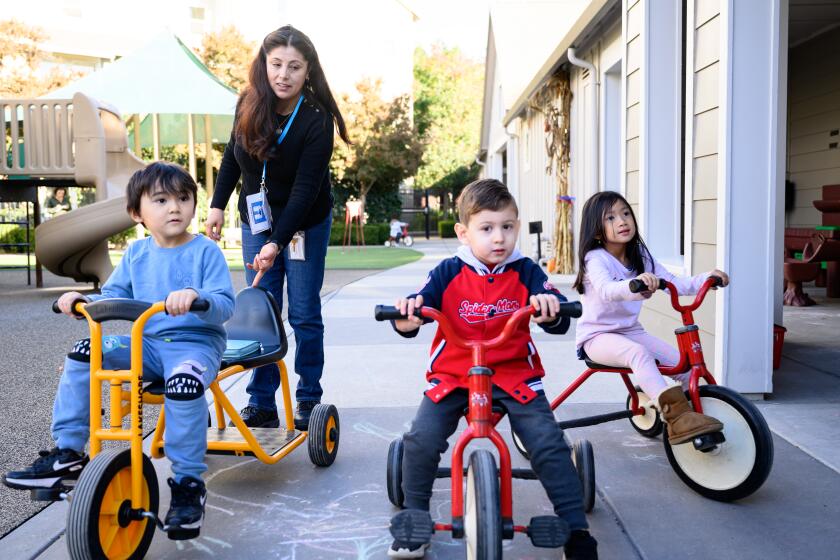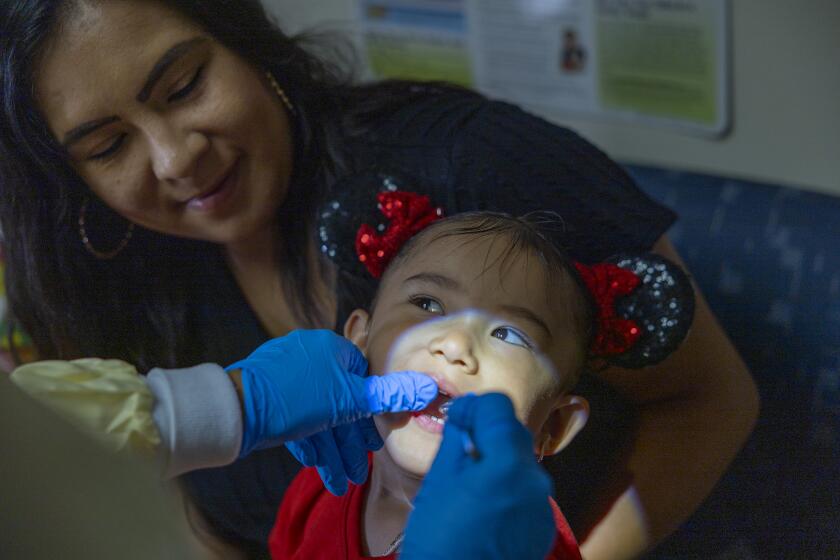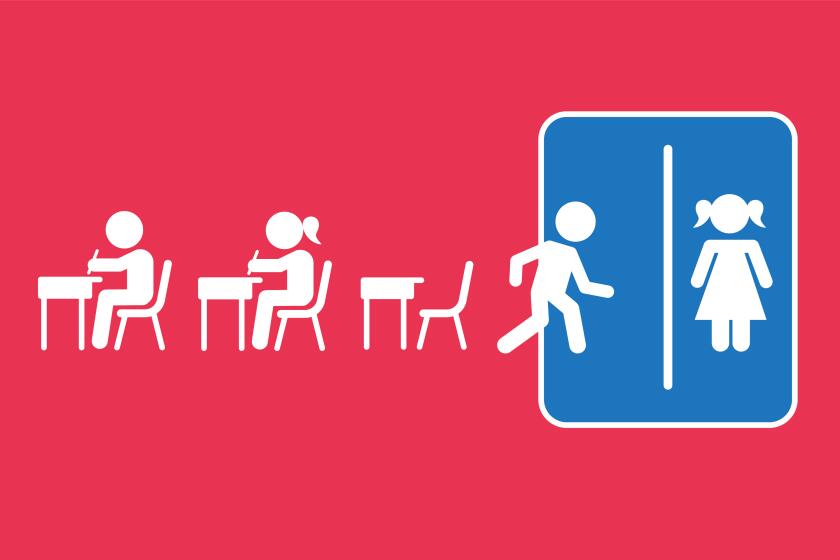Five takeaways from our expert panel on preschool behavior and expulsion
- Share via
Early childhood experts and parents talk about navigating preschool behavior, suspension and expulsion with the Los Angeles Times and The Mamahood.
- Share via
Challenging behavior among preschoolers isn’t easy to navigate. It can get especially frustrating if you feel your child is being unfairly disciplined in the classroom.
Here are five takeaways from a discussion among L.A. Times early childhood reporter Jenny Gold; Heather Anderson, administrator of the Mamahood Facebook group; Rahil Briggs of Zero to Three; Tunette Powell, an assistant research professor at Arizona State University; and Bobbi-Jean Blaisdell, a mom navigating behavioral issues with her son. They spoke to the Mamahood Facebook group.
California law restricts preschools from expelling kids, yet an increase in behavioral problems since the pandemic is proving a big challenge for teachers.
All preschoolers act out. Look instead for the patterns.
It’s common and appropriate for a young child to act out. When looking at a toddler’s challenging behavior, it’s important to take into account intensity, frequency and duration.
A meltdown during a time of transition might mean something different than a child throwing a lengthy tantrum every day, said Briggs, a psychologist and national director of Zero to Three’s HealthySteps program.
“One person’s huge tantrum is another person’s Tuesday morning,” Briggs said. Aggressive behavior could just mean a child just needs more sleep, or it could be an indication that something deeper is amiss, she said.
Look for small changes that can aid your child. With help from a teacher, Blaisdell, whose son has been expelled from two schools, was able to recognize that he could benefit from more frequent breaks during the day to get out his energy, and from a heads-up about changes to his routine.
Speak up if you feel your child is being unfairly disciplined.
Speak up and find out why your child is being disciplined, Powell said, and lean into your community.
Never go to a meeting alone. Bring a friend or family member who can be by your side to advocate with you and take good notes, said Powell, whose own sons were suspended multiple times from preschool.
Briggs recommended capturing video of your child being helpful or kind and showing it to a teacher as a way to demonstrate good behavior. It can also showcase strengths and how well a child performs in another setting, and can be used to help a parent advocate for changes to a child’s environment at school, she said.
Understand that biting at school can be scary, but is expected.
All kids bite. Help your child understand why they shouldn’t repeat the behavior. It can be difficult to have a straightforward talk with a toddler or 3-year-old about biting, but there are other ways to connect with them about it.
Use play therapy, Briggs said. Reenact the behavior and consequences with stuffed animals, for example, to help them process what happened and understand why the behavior was not acceptable.
Make sure your child isn’t getting rewarded for bad behavior, said Briggs, who recalled an instance when a student was persistently removed from the classroom as a consequence. But the the child would always receive hot chocolate in the teacher’s lounge when it happened.
Don’t overreact if your child gets bitten. Understand that all kids are still learning, Powell said.
California ranks among the worst states for kids’ teeth with a lack of care partly to blame. With candy everywhere, Halloween is an extra scary time.
Discourage challenging behavior by being firm and calm.
Use your “zen robot voice,” Briggs said. No matter whether your child hits, bites or throws a toy, be sure to say “no” firmly, avoid emotion and remove reward, she added.
An emotional reaction can work against you because a child can get satisfaction out of the response they’ve elicited from you.
Don’t let frustration or shame overshadow your child’s needs.
It’s easy to get wrapped up in stress and discomfort when your child is having trouble behaving at school. A lot of parents expect their children to have a perfect experience at school, but that won’t always be the case.
California’s 4-year-olds are entering transitional kindergarten. But many young learners aren’t fully potty-trained, an issue public schools are grappling with.
Initially, shame made Blaisdell want to apologize and walk away when her son would have an issue at school. But as the behavior continued, she began asking more about the situations surrounding each incident, which gave her a better understanding of her son’s underlying issues.
“I didn’t get to that place though as quick as I feel I should have because of the shame I immediately felt for my child biting another child,” Blaisdell said.
Because of that, it’s important to have a community-oriented mind-set, Powell said. That was echoed by Anderson, whose son was expelled from preschool years ago and said she felt isolated while navigating their children’s behavior at school. Empathize with the classmate who is acting out, and don’t let your first reaction be to seek a punishment for them, Powell said.
This article is part of The Times’ early childhood education initiative, focusing on the learning and development of California children from birth to age 5. For more information about the initiative and its philanthropic funders, go to latimes.com/earlyed.
More to Read
Sign up for Essential California
The most important California stories and recommendations in your inbox every morning.
You may occasionally receive promotional content from the Los Angeles Times.


















